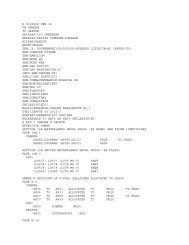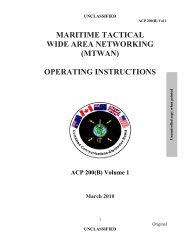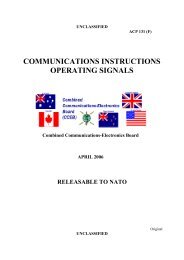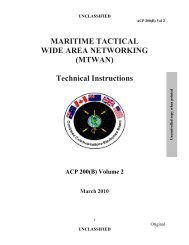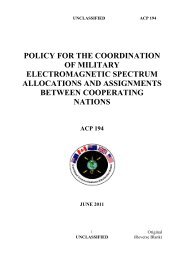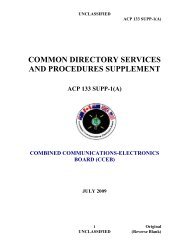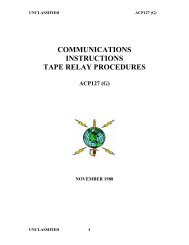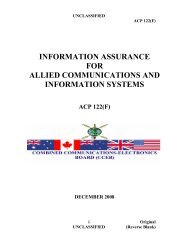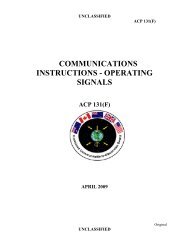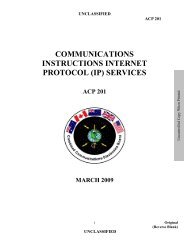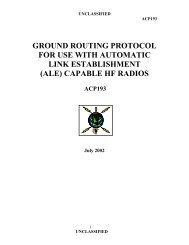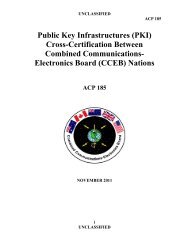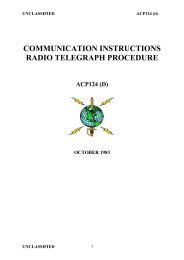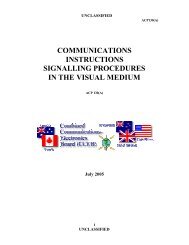ACP 137
ACP 137
ACP 137
Create successful ePaper yourself
Turn your PDF publications into a flip-book with our unique Google optimized e-Paper software.
UNCLASSIFIED<br />
<strong>ACP</strong> <strong>137</strong><br />
428. This should appear in the message text and the data file (where appropriate).<br />
However, it has been identified that certain systems may be unable to present the first line of<br />
text in this form due to internal implementation restrictions. Some flexibility may be required<br />
in the exact format of the information.<br />
429. In the message body text, it must appear as the first line of Griffin DS Control<br />
Information. In the data file, it must also appear as the first line of commented out heading<br />
information.<br />
TYPES OF REPLICATION<br />
430. There are three types of replication used for the Griffin DS. These are initial,<br />
incremental and verify, and each is described further in the following sub-paragraphs.<br />
INITIAL REPLICATION<br />
431. This type of replication comprises a full replication of all data to be shared below the<br />
high level DIT and is used to initially populate a nation’s lower level DIT. This full<br />
replication requires a sending nation to include all entries in their low level DIT that apply to<br />
the receiving nation. The data will contain all entries, attributes, and values that a nation is<br />
willing to share with the receiving nation. In the case of LDIF format data files, variations in<br />
production of these files requires support on receipt for the inclusion of changetype: add<br />
LDAP operations.<br />
432. A full replication may also be needed between nations to solve operational problems.<br />
The frequency of these total refreshes will be by agreement between the replication peers.<br />
Nations must ensure that a capability is available to generate an appropriate initial replication<br />
file on request from a peer nation within a mutually agreeable period of time. In addition, a<br />
sending nation may need to reset shared directory information due to some internal operational<br />
reason. In this case, a nation may send an Initial Replication at any time with a sequence<br />
number of zero. Where practical, the sending nation should contact the receiving nation<br />
offline to indicate this occurrence.<br />
INCREMENTAL REPLICATION<br />
433. This type of replication will update the sending nation’s lower-level DIT with<br />
changes that have occurred from the last data exchange between the replication peers. The<br />
data file will contain operations to be performed on the receiving nation’s local directory to<br />
bring it into alignment with the sending nation’s copy of the DIT. Where LDIF format data<br />
files are used for incremental updates, changes are expressed using the LDIF changetype<br />
syntax to add entries, delete entries, modify existing entries and modify an entry’s DN.<br />
434. Incremental replication will be performed on an agreed frequency, except for<br />
emergency situations where updates need to be sent outside of the normal schedule.<br />
Therefore, in order to maintain the replication frequency, if no changes have occurred since<br />
the last scheduled incremental replication, a “blank” data file will be sent, containing no<br />
4-7<br />
UNCLASSIFIED<br />
Original



